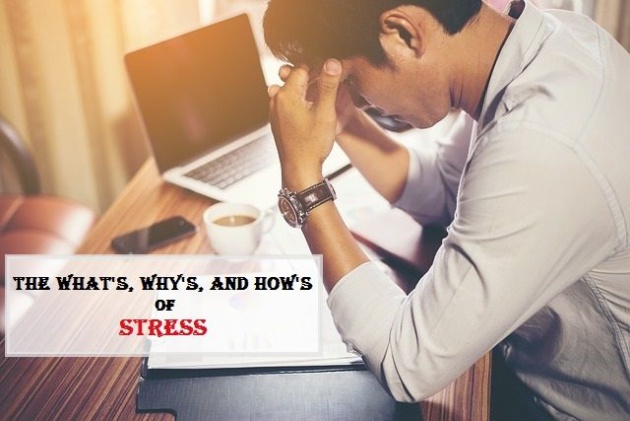
Image Credit: caio_triana via Pixabay / Edited via Photoshop
Stress is like spice, necessary in the right amount to make a dish flavorful, but too much of it can ruin the dish. Just like people, a little stress can be good for you and too much can cause you to break down.
Stress is like spice - in the right proportion it enhances the flavor of a dish. Too little produces a bland, dull meal; too much may choke you.
Source:Donald Tubesing
✤What is Stress?✤
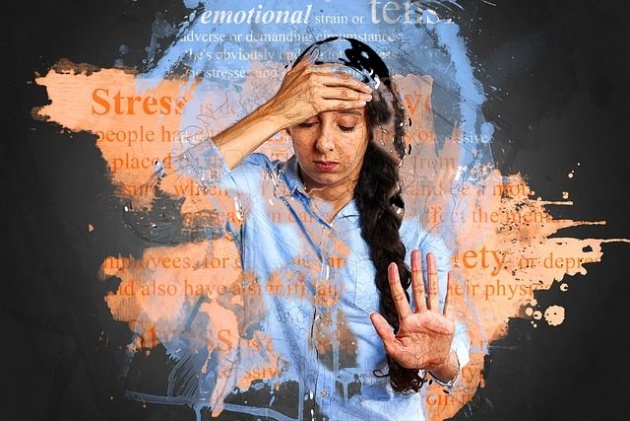
Image Credit: TheDigitalArtist via Pixabay
Stress is the feeling that people get when they are overloaded and struggling to cope with demands. This demands can be challenges, threats, and dangers - whether it's real or imagined - this causes the body's automatic defensive properties known as the "stress response" or better known as the fight-or-flight reaction to kick in.
When the body feels stress, your hypothalamus signals your adrenal glands to release a surge of hormones, which include adrenaline and cortisol, into the bloodstream. As these hormones are released, the liver is triggered to produce more blood sugar, which gives you an energy kick, breathing becomes more rapid, which causes your heartbeat and blood pressure to rise.
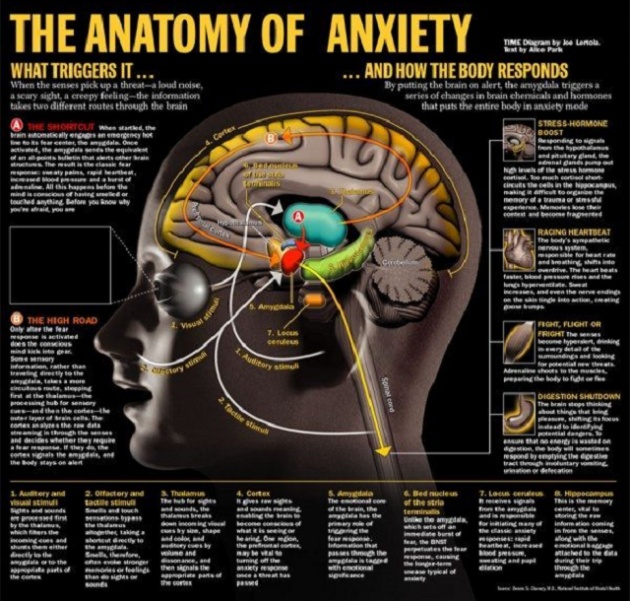
Image Credit: liveinthenow.com
Once the source of the stress has passed, hormone levels, heart rate, blood pressure, and other related systems also return to normal.
Here are some facts about stress.
- Stress can help the body prepare to face challenges and dangers.
- The symptoms of stress can be both physical and psychological.
- Short-term stress (Eustress) can be helpful, while long-term stress (Distress) can be harmful and cause various health conditions.
Here is a short video about stress.
Video Credit: MoreThanMedication via Youtube
✤The Effects of Stress on the Body✤

Image Credit: Free-Photos via Pixabay
Depending on the situation and the severity of the level, stress can affect the body in various ways. It can affect the body's digestive and immune systems leading to a variety of health problems.
Here is a quick overview of how stress affects the body.
- Breathing faster.
- The blood pressure and the pulse rate rises.
- The muscles become tense.
- A heightened state of alertness.
- Sleeping too much or too little.
- Acne.
- Hair loss.
- The digestive system slows down which causes a lack of appetite.
- Stress eating which can cause weight problems.
- The immune activity decreases which can cause a variety of health diseases.
- Irritability and anger.
- Any kind of pain.
- Depression and Anxiety.
- Loss of sex drive.
Here is a short video on how stress affects your body.
Video Credit: TED-Ed via Youtube
Stressors can affect people in different ways, how we react to a situation will affect how stress can affect us and our health. people who think that they don't have enough resources to cope with the situation will most likely have a stronger reaction than those who feel that they can overcome the problem.
✤Eustress vs Distress✤
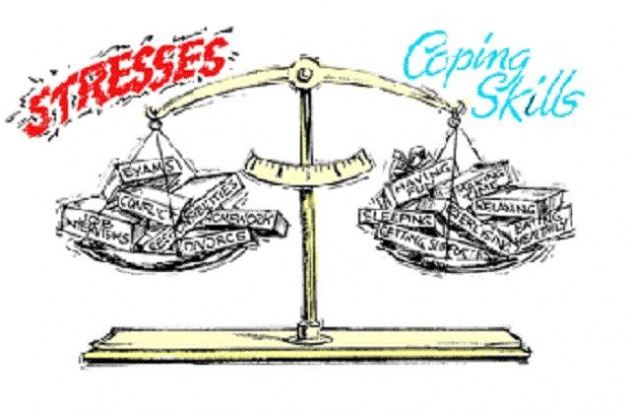
Image Credit: tmcctech4ed
Not all stress is negative and not all stress is positive. Depending on the situation, the resources available, and our mindset, stress can be beneficial or it can be harmful.
Reacting positively to situations caused by stress is called as eustress, while persistently having a negative response to such situations is called as distress.
✤What is Eustress?✤

Image Credit: JESHOOTScom via Pixabay
In daily life, stress is always known to describe a negative situation, this causes people to feel that all stress is bad for you, which is not true. A little bit of stress in our life is good for us, it can help you perform better under pressure and can be a motivator for you to work better. This type of stress is called eustress.
Eustress is a productive stress, this is the type of stress that helps us improve and become more productive. Although I say it is a productive stress, it does not mean it is a better type of stress it is more about how you perceive problems as challenges rather than obstacles.
Here are some characteristics of eustress.
- It can help focus our energy and motivate us to do better.
- It is only for a short-term.
- It is within a person's coping abilities.
- It can help improve performance.
- It can feel exciting.
✤What is Distress?✤

Image Credit: TheDigitalArtist via Pixabay
In contrast to eustress, distress is the persistently negative response to a challenge, also known as negative stress, it is both destructive and demotivating, and it can have detrimental effects on our health and happiness.
Here are some characteristics of distress.
- It can lead to a decrease in performance.
- It can cause anxiety or agitation.
- It can be short- or long-term
- It is perceived outside of our coping abilities.
- It feels unpleasant.
- It can lead to physical, mental, and emotional problems, such as depression, moodiness, irritability, anger, loneliness, and more.
- it can cause thinking and memory problems.
- it can lead to poor judgments.
People that have been stressed for a long time are more likely to have a final breakdown which can lead to depression, suicides, violence, heart attacks, and strokes.

Image Credit: HASTYWORDS via Pixabay
✤Examples of Eustress and Distress✤
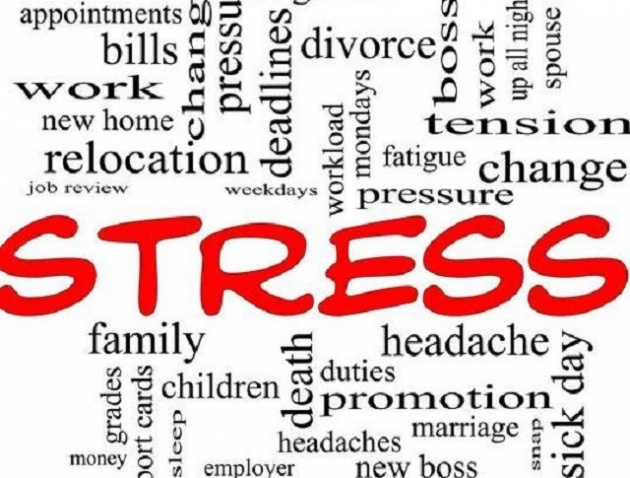
Image Credit: blmhospital.com
Although it is somewhat hard to characterize stressors into eustress and distress, this is because people are different and they all react differently to stressors. But by generalizing we can make a list of typically experienced list of positive and negative stressors to most people.
Here are some general examples of positive stressors.
- Marriage.
- Starting a new job.
- Having a child.
- Learning a new hobby.
- Taking educational classes.
- Retirement.
- Buying a car.
- Buying a house.
- Moving to a new home.
- Taking a vacation.
- Receiving a promotion or a raise at work.
- Holiday seasons.
Alternatively, here are some general examples of negative stressors.
- The death of a spouse or a family member.
- Injury or illness of self or of a family member.
- Filing for divorce.
- Being abused or neglected.
- Legal problems.
- Unemployment.
- Job insecurity.
- Sleeping problems.
- Bankruptcy or money problems.
- Interpersonal relationship problems.
- Family problems.
- Children's problems at school.
- Hospitalization of self or of a family member.
- Problems at work.
- Conflicts with workmates and supervisors.
- Fears such as fears of flying, public speaking, and more.
On a final note, just like spice, we all have different tolerance levels as such your distress could be my eustress and vice-versa.

Image Credit: shutterstock.com
Hope you have a positive stress.
~oOOOo~vvvvv~oOOOo~
If you're not a Bitlanders member yet, sign up and click here.
You can post and earn $$$.
~oOOOo~vvvvv~oOOOo~
Thank you for reading! Have a good day!
Written by Eeza_1986 for Bitlanders.



